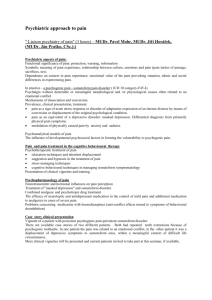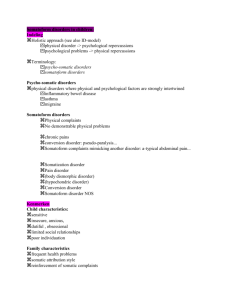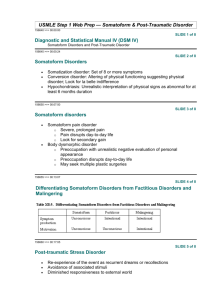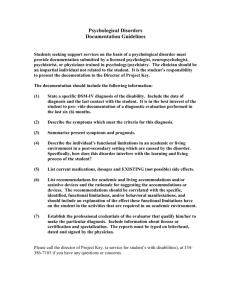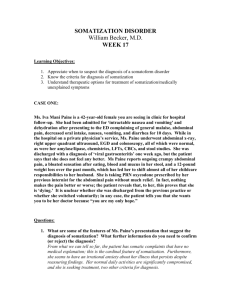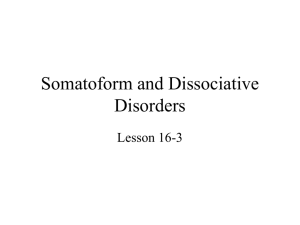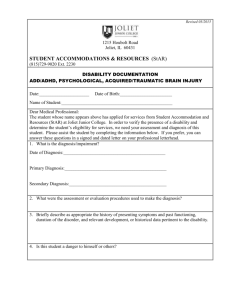Judge Joseph Johnston January 29, 2014 The Coalition for
advertisement
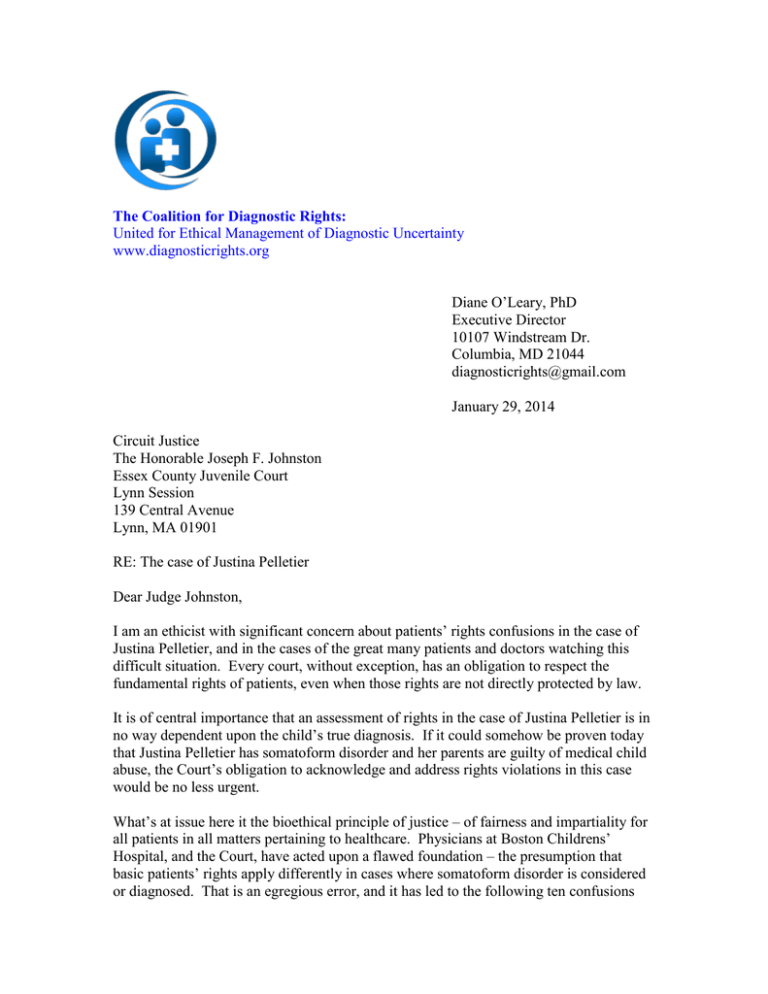
The Coalition for Diagnostic Rights: United for Ethical Management of Diagnostic Uncertainty www.diagnosticrights.org Diane O’Leary, PhD Executive Director 10107 Windstream Dr. Columbia, MD 21044 diagnosticrights@gmail.com January 29, 2014 Circuit Justice The Honorable Joseph F. Johnston Essex County Juvenile Court Lynn Session 139 Central Avenue Lynn, MA 01901 RE: The case of Justina Pelletier Dear Judge Johnston, I am an ethicist with significant concern about patients’ rights confusions in the case of Justina Pelletier, and in the cases of the great many patients and doctors watching this difficult situation. Every court, without exception, has an obligation to respect the fundamental rights of patients, even when those rights are not directly protected by law. It is of central importance that an assessment of rights in the case of Justina Pelletier is in no way dependent upon the child’s true diagnosis. If it could somehow be proven today that Justina Pelletier has somatoform disorder and her parents are guilty of medical child abuse, the Court’s obligation to acknowledge and address rights violations in this case would be no less urgent. What’s at issue here it the bioethical principle of justice – of fairness and impartiality for all patients in all matters pertaining to healthcare. Physicians at Boston Childrens’ Hospital, and the Court, have acted upon a flawed foundation – the presumption that basic patients’ rights apply differently in cases where somatoform disorder is considered or diagnosed. That is an egregious error, and it has led to the following ten confusions Judge Joseph Johnston 2 January 29, 2014 about the basic rights of Justina Pelletier and her parents. No doctor’s care plan, and no court decision can justly be based on failure to respect fundamental patients’ rights because of diagnosis of somatoform disorder. 1. Justina Pelletier had a right to a surrogate decision maker the instant BCH felt it was appropriate to override parental decision-making authority. That right was violated by BCH physicians when her parents’ decision to bring their daughter to Boston Childrens’ Hospital to see Dr. Flores was ignored on the day they first arrived. The care plan presented to her parents three days later again ignored their decisions about their daughter’s care, and again failed to consult a surrogate decisionmaker. That problem persisted for an appalling two months, as parental authority had been eliminated and DCF neglected to involve themselves in the child’s medical care in any way until the child was admitted to Bader 5 on April 9th. Even if BCH doctors were correct in their diagnoses of somatoform disorder and medical child abuse, no doctor has the right or the authority to make medical decisions on behalf of a current, non-emergent patient under any circumstances. Every violation of the right to a surrogate decision-maker is a case of medical tyranny. It is unacceptable for the Court to fail to recognize that and act on it. 2. The Court’s criteria for appropriate parental medical decision-making in this case could not possibly have been met, and cannot now be met by any custodian or caregiver. When the Court upheld DCF’s decision to take custody of the child, the Court established, by implication, the standard that parents must accept the expert opinions of their child’s doctors. The Pelletiers arrived at BCH, however, with a standing diagnosis and treatment plan by a doctor at Tufts whose opinion the Court has respected. If the Pelletiers had met the Court’s standard of accepting the expert opinions of doctors at BCH, it would have required challenging and rejecting the expert opinions of their child’s doctors at Tufts. No parent can meet the requirements of a self-contradictory standard. Further, no appointed custodian, and no appointed provider can meet a self-contradictory standard. Any court-appointed custodian or provider who has met the standard of accepting the expert conclusions of BCH will simultaneously fail to meet the standard of accepting the expert conclusions of Tufts. Judge Joseph Johnston 3 January 29, 2014 3. The Court arrived at this self-contradictory juncture because it directly violated a fundamental right at the start without sufficient cause: the right to make autonomous decisions for oneself or one’s child. In order for the Court to have earned the authority to choose between conflicting medical opinions about the child, it must have first established adequate grounds for declining the parents’ right and authority to make those decisions. In this regard, the Court reasoned with the wrong order of principles. If the Court remained unbiased as to which medical opinion is correct – as it must in every case until there is reason to intervene – it would not have had grounds on which to challenge the Pelletiers’ authority to decide for themselves between the conflicting medical opinions. Diagnosis of somatoform disorder does not lend special authority to any doctor or any court. No patients’ right, and no parents’ right, is in any way weakened by considerations of somatoform disorder. 4. Linda Pelletier’s competent authority to make medical decisions on behalf of her daughter was acknowledged and respected on February 13, 2013, when her signed consent was directly requested by BCH doctors on their new care plan for her daughter. When she refused to consent, and precisely because she refused to consent, BCH doctors made charges of medical child abuse that led directly to DCF taking custody of the child. “If a patient is competent to consent to an operation, the patient is competent to refuse consent as well”, writes Dr. George Annas in The ACLU Guide to Patients’ Rights. “A person is not incompetent simply because the person refuses treatment or disagrees with the physician. If this were so, the entire doctrine of informed consent would collapse into a right to agree with your doctor.” The Court has an obligation to acknowledge that an egregious violation of the parents’ rights, and the child’s rights, took place as those events unfolded. Like patient competence, parental authority to make a child’s medical decisions is fully confirmed when doctors overtly seek their consent, and it cannot then be challenged solely on the basis of refusal of consent. 5. The Pelletiers’ inclination to resist withdrawing their daughter’s standing medical treatments was a natural and appropriate product of good instinct about their obligation to provide necessary medical care. It is neither natural nor reasonable to expect parents will understand – along with their obligation to provide care, or in place of it – an obligation to refuse established care they’ve been told is necessary on the basis of a new doctor’s difference of opinion. Judge Joseph Johnston 4 January 29, 2014 In any situation where a doctor seems to misunderstand the severity of a child’s symptoms, it is a parent’s obligation to try to correct that misunderstanding, and failure to do so would generally be considered neglect of parents’ legal obligations. It is unreasonable to expect parents to recognize that cases of somatoform diagnosis are somehow a unique exception to this rule. Moreover, the Court would be hard pressed to explain why a unique exception should hold in cases of somatoform diagnosis, or how, in fact, good parents could possibly come to recognize such an exception. No court can justly find a parent irrational or unsafe for holding a view about their child’s medical condition that is shared by doctors whose expertise is not questioned by the court. 6. The evidence the Pelletiers received from BCH about their daughter’s diagnosis of somatoform disorder was not sufficient to overturn any good parent’s instinct to continue to provide their child with established necessary medical care. The evidence BCH provided was very weak. It did not include advice from specialists in the area of their daughter’s condition, and it did not involve positive evidence of psychiatric disorders. As the Pelletiers’ understood it, their daughter was being refused established, necessary, previously successful medical care for a standing diagnosis of a potentially deadly disorder purely because BCH specialists in an unrelated field had general opinions unrelated to the details of their daughter’s case. 7. In insisting that their daughter should continue to be treated according to her established medical care plan, the Pelletiers abided by legal requirements and precedents set for parental decision-making, all of which place obligations on parents not to refuse necessary medical care. Dr. George Annas writes, on behalf of the ACLU, “to deny the child lifesaving treatment is usually considered child neglect, and the state has an obligation to exercise its parens patriae power to protect children from neglect.” 8. Even if the Pelletiers are guilty of medical child abuse they have a right to a detailed explanation of the basis on which their right to make medical decisions for their child has been eliminated by the Court. No traits of parents relieve a court of its obligation to explain, and adequately support, the decision to override parental authority to make a child’s medical decisions. Without requirements such as these courts would systematically fail to respect patient autonomy, and parent autonomy. Without the requirement to provide successfully supported explanations, no patient, and no parent, is protected from tyranny in the court, Judge Joseph Johnston 5 January 29, 2014 or tyranny in the hospital - from judges, or doctors, asserting unearned authority to make patients’ medical decisions. 9. Even if the Pelletiers are guilty of medical child abuse the Court has an obligation to prepare and present an explanation for accepting the continued demand of Boston Childrens’ Hospital to treat Justina Pelletier in a locked inpatient psychiatric facility rather than in an outpatient setting. Insurers do not cover inpatient psychiatric stays even for short periods for somatoform disorder, because the standard of care does not require that level of treatment. With an inpatient stay of nearly a year, adequate parenting would certainly lead to a demand for detailed explanations as to why the standard of care for somatoform disorder in this child’s case is so drastically different from what it is for other patients. The Court’s difficulty in making alternative care arrangements is not sufficient cause for continuing to detain the child in a locked mental health ward. If alternative arrangements cannot be made because new providers, facilities or agencies will not agree to abide by the Court’s constraints, this is a clear indication that those constraints fail to meet basic standards of care. If there do not exist fully supported, independent psychiatric grounds for Justina Pelletier’s continued detention in a locked mental health facility, the Court must either alter its constraints to make alternative arrangements possible, or return the child to her parents. 10. Bader 5’s approach of aggressive behavior modification therapy for children with somatoform diagnosis is an atrocity, and it is one the Court has sufficient evidence to recognize. No somatoform diagnosis can be decisively confirmed because there simply is no science to support a direct correlation between the absence of medical explanations for symptoms and the presence of mental health disorders. As a result, somatoform diagnosis is notoriously inaccurate, and dangerously so. It is unconscionable for those who treat somatoform disorder not to take stock of the great potential for diagnostic error in their field. If aggressive behavioral modification techniques are employed, severe emotional harm will certainly result for those diagnosed in error – that is, for those whose genuine physical suffering and disabilities are repeatedly met with punishment designed to encourage impossible control. Aggressive behavior modification therapy for the physical symptoms of children who are actually medically ill is heinous. Because error in somatoform diagnosis can never be ruled out, it cannot be ethical for those techniques to be employed in the treatment of somatoform disorder in children. Judge Joseph Johnston 6 January 29, 2014 The Court is aware that Bader 5 does routinely employ aggressive behavior modification techniques for children with somatoform disorder. Because the Court cannot be certain whether Justina Pelletier does or does not have somatoform disorder, or which of her symptoms are medical and which are somatoform, it is unconscionable to allow further treatment by BCH or any other facility where these techniques will be employed. I acknowledge that the case of Justina Pelletier brings to the Court a range of considerations about which there has been little specific discussion in the medical field or in the field of bioethics, but nevertheless insist that this in no way relieves the Court of its obligation to overtly discern and respect standard patients’ rights. I respectfully request a systematic review of the Court’s decisions based on concern to acknowledge and respect these ten fundamental confusions about the rights of Justina Pelletier and her parents, Lou and Linda Pelletier. Sincerely, Diane O’Leary, PhD cc: Deval Patrick, MA State Governor Marttha Coakley, MA Attorney General Olga Roche, MA DCF Commissioner Virginia Peel, MA DCF General Counsel William Cusick, JD Beau Berman, FOX CT Cheryl Bartlett, MA Department of Public Health Commissioner Anderson Cooper, CNN News Lewis Bossing, Bazelon Center for Mental Health Law Dr. Alice Newton, Boston Children’s Hospital Child Protection Team Dr. Ioana Simona Bujoreanu, Boston Childrens’ Hospital Dr. David DeMaso, Boston Childrens’ Hospital Susan James, ABC News Chester Tennyson, JD Bill O’Reilly, FOX News Barry Pollack, JD Children's Mental Health Access Project YaMinco Varner, Child Welfare League of America Glenn Beck, The Blaze National Federation of Families for Children's Mental Health Jessie Rossman, JD, ACLU of MA
